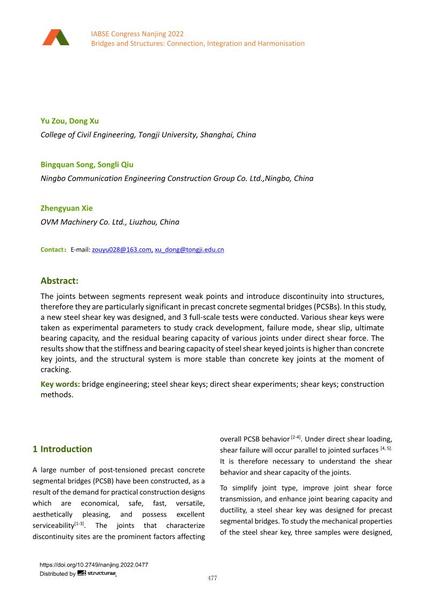Experimental Study on Shear Performance of Steel Shear Key Dry Joint in Precast Segmental Bridges

|
|
|||||||||||
Détails bibliographiques
| Auteur(s): |
Yu Zou
(College of Civil Engineering, Tongji University, Shanghai, China)
Dong Xu (College of Civil Engineering, Tongji University, Shanghai, China) Bingquan Song (Ningbo Communication Engineering Construction Group Co. Ltd.,Ningbo, China) Songli Qiu (Ningbo Communication Engineering Construction Group Co. Ltd.,Ningbo, China) Zhengyuan Xie (OVM Machinery Co. Ltd., Liuzhou, China) |
||||
|---|---|---|---|---|---|
| Médium: | papier de conférence | ||||
| Langue(s): | anglais | ||||
| Conférence: | IABSE Congress: Bridges and Structures: Connection, Integration and Harmonisation, Nanjing, People's Republic of China, 21-23 September 2022 | ||||
| Publié dans: | IABSE Congress Nanjing 2022 | ||||
|
|||||
| Page(s): | 477-482 | ||||
| Nombre total de pages (du PDF): | 6 | ||||
| DOI: | 10.2749/nanjing.2022.0477 | ||||
| Abstrait: |
The joints between segments represent weak points and introduce discontinuity into structures, therefore they are particularly significant in precast concrete segmental bridges (PCSBs). In this study, a new steel shear key was designed, and 3 full-scale tests were conducted. Various shear keys were taken as experimental parameters to study crack development, failure mode, shear slip, ultimate bearing capacity, and the residual bearing capacity of various joints under direct shear force. The results show that the stiffness and bearing capacity of steel shear keyed joints is higher than concrete key joints, and the structural system is more stable than concrete key joints at the moment of cracking. |
||||
| Copyright: | © 2022 International Association for Bridge and Structural Engineering (IABSE) | ||||
| License: | Cette oeuvre ne peut être utilisée sans la permission de l'auteur ou détenteur des droits. |
||||
